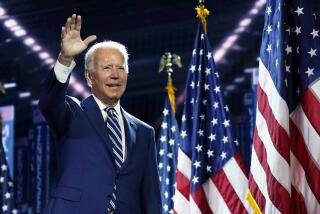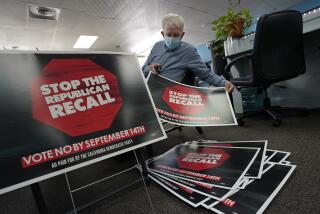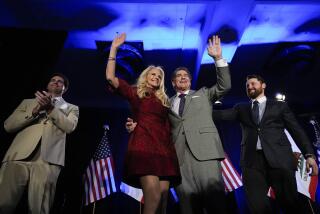Bill on Early Presidential Primary Gains
- Share via
SACRAMENTO — Seeking to give California more clout in the nomination of future Presidents, a Senate-Assembly conference committee on Wednesday approved legislation to move the state’s presidential primary from June to March.
The change would place California’s primary third in line on the current calendar, behind only the Iowa caucuses and the New Hampshire primary.
The state’s legislative and congressional primaries would continue to be held in June. The presidential primary, to be held on the Tuesday after the first Monday in March, would cost at least $30 million every four years, state officials have said.
The conference committee action should pave the way for approval of the measure in the full Senate and Assembly next week. But a few hitches remain.
Assembly Republican Leader Ross Johnson of La Habra did not attend the conference committee meeting and has said he opposes the bill. Johnson supports moving the presidential primary to March, but also wants to move the legislative and congressional primaries to September.
Johnson and the 33 GOP lawmakers in the Assembly lack the votes to stop the bill, but they could urge Republican Gov. George Deukmejian to veto it. Deukmejian, although he has reservations, has indicated that he could support changing the presidential primary date.
“He favors the March-September schedule, but he is willing to consider other options,” Susan Trowbridge, a Deukmejian spokeswoman, said Wednesday.
The governor and legislators from both parties also are concerned about the possibility of initiatives appearing on the special presidential primary ballot, which is likely to draw more voters from one party than the other in many years. In 1992, for instance, when President Bush is expected to run unopposed while several Democrats vie for their party’s nomination, the turnout is probably going to be lopsided in favor of the Democrats.
“If there’s only a Democratic primary and no Republican primary, you have a very narrow turnout, which might be fruitful for some initiatives,” said Senate Republican Leader Ken Maddy of Fresno. “This would just be one more opportunity to qualify and perhaps find an easy method for passing an initiative.”
It would take an amendment to the California Constitution to keep initiatives off of any particular statewide ballot. Maddy said he probably will propose such an amendment next week. If approved by a two-thirds vote of both houses of the Legislature, the amendment would go before the voters in November. That could be done separately from the bill to move up the primary.
Assemblyman Jim Costa (D-Fresno), the bill’s sponsor, said he believes that moving the primary date would give California a greater voice in national politics. Under current rules, California--the nation’s most populous state--is among the last to hold its primary. Not since 1972, when the Democrats nominated Sen. George McGovern, has either party’s race been decided in California.
“I think this will have a tremendous effect, not only in California but nationwide,” Costa said. “It will give us more political clout which will translate into more social and economic impact on the decisions that are made in Washington.”
Opponents of the bill have argued that the early primary will give an advantage to candidates with big campaign treasuries or high name recognition--candidates one senator described as “the rich and the retreads.”
But Costa said that little-known candidates will still have the opportunity to campaign for weeks in Iowa and New Hampshire in hopes of scoring an upset that will give them national attention.
“If you’re not able to create any momentum out of Iowa or New Hampshire you have serious problems,” he said.
More to Read
Get the L.A. Times Politics newsletter
Deeply reported insights into legislation, politics and policy from Sacramento, Washington and beyond. In your inbox twice per week.
You may occasionally receive promotional content from the Los Angeles Times.










